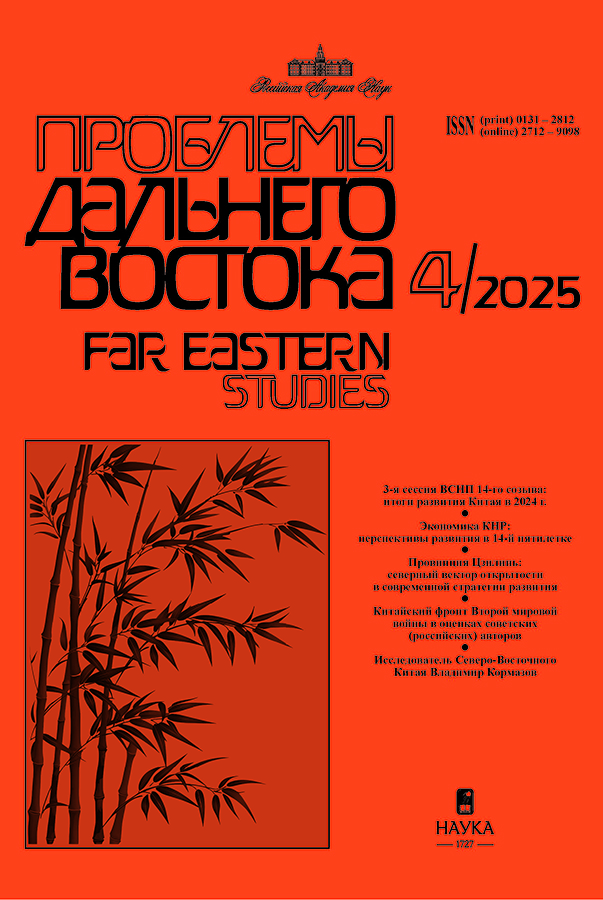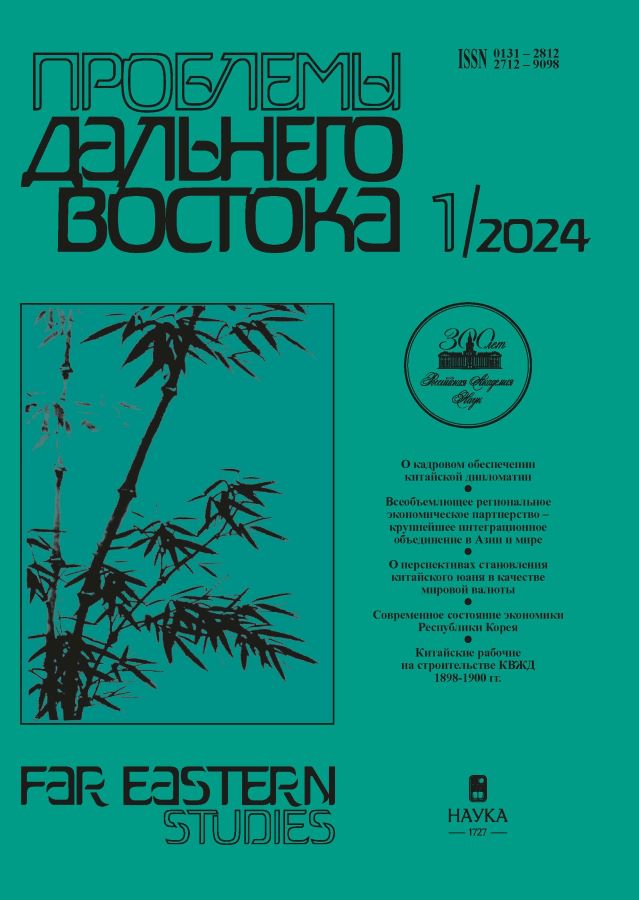Activities of the USSR Society of Cultural Relations with Foreign Countries on the Visit of the Chinese Education Mission in 1933
- Authors: Verchenko A.L1
-
Affiliations:
- Institute of China and Contemporary Asia of the Russian Academy of Sciences
- Issue: No 1 (2024)
- Pages: 166-176
- Section: Culture
- URL: https://rjmseer.com/0131-2812/article/view/676388
- DOI: https://doi.org/10.31857/S0131281224010131
- ID: 676388
Cite item
Abstract
The article for the first time in Russian sinology analyses the activities of the USSR Society for Cultural Relations with Foreign Сountries (VOCS) on the visit to Moscow in 1933 of the delegation of Chinese educators. The study was done on the basis of unknown in the scientific sphere documents of the State Archive of the Russian Federation, as well as the publications of foreign and Chinese researchers. China under Chiang Kai-shek planned a fundamental reform of the education system and intended to use suitable foreign experience, including the Soviet. On behalf of the Government, the VOCS dealt with the organizational and substantive aspects of the reception of the delegation that arrived in the Soviet Union after visiting Italy, Poland, Germany, Great Britain, France, Denmark, Austria, and spent 13 days in Moscow. The visit of a delegation, which was composed of key figures of the Chinese educational system, was important for the USSR from two points of view: from the political point of view (implementation of inter-state contacts after the restoration of diplomatic relations between China and the USSR in December 1932) and from the humanitarian point of view (development of interaction in a specific field of culture). It was an opportunity for our country to demonstrate to the international community the progress made in the reforming of the educational system and its advantages under socialism. The VOCS’s leading figures Vice-President E.O. Lerner and Secretary-General and Chairman of the VOCS Education Section M.J. Apletin met with the delegation. The delegation was received by the Chairman of the People’s Сommittee of Enlightenment A.S. Bubnov. The analysis of the documents shows that the delegation studied the Soviet experience and planned to use it to some extend in China. The VOCS has fulfilled the objectives set by the authorities of the country to organize the visit and to provide professional assistance to Chinese educators, made every effort to create conditions for maintaining and further developing Soviet-Chinese cultural ties.
About the authors
A. L Verchenko
Institute of China and Contemporary Asia of the Russian Academy of Sciences
Author for correspondence.
Email: veailan@yahoo.com
ORCID iD: 0000-0002-8718-8338
Senior Researcher
Moscow, Russian FederationReferences
- Верченко А.Л. Всесоюзное общество культурной связи с заграницей и становление советско-китайских культурных связей в 1920-е годы // Восточная Азия: факты и аналитика. 2023. № 1. С. 6–17. doi: 10.24412/2686–7702–2023–1–6–17
- Документы Государственного архива Российской Федерации (ГАРФ).
- История Китая с древнейших времен до начала XXI века: в 10 т. Т. VII. Китайская Республика (1912–1949). М.: Наука–Вост. лит. 2013. 863 с.
- Boehmer Bert. Chinese Educational Mission to Europe, 1932/33. Carl Heinrich // Geschichte einer großbürgerlichen Familie in Briefen und Dokumenten. Juli 28, 2016. URL: http://carl-heinrichbecker.de/chinese-educational-mission-to-europe-193233 (дата обращения: 27.11. 2023).
- Pei Gao. Risen from Chaos: the development of modern education in China, 1905–1948. A thesis submitted to the Department of Economic History of the London School of Economics for the degree of Doctor of Philosophy. London, March 2015. 196 p.
- Saikawa Takashi. From Intellectual Co-operation to International Cultural Exchange: Japan and China in the International Committee on Intellectual Co-operation of the League of Nations, 1922–1939 // heiDOK. URL: http://www.ub.uni-heidelberg.de/archiv/20294 (дата обращения: 30.11.2023).
- Shubinsk Barbara. The Rockefeller Foundation’s Rural Reconstruction Program in 1930s China [Программа восстановления сельских районов Фонда Рокфеллера в Китае 1930-х гг.] // Rockfeller Archive Center. January 25, 2022. URL: https://resource.rockarch.org/story/the-rockefellerfoundations-rural-reconstruction-program-in-1930s-china/ (дата обращения: 15.11.2023).
- 王聪颖: 中国考察欧洲八国教育始末 [Wang Congying. Китай знакомится с образованием в восьми странах Европы] // 辛亥革命. 04.08.2016. URL: http://www.xhgmw.com/m/view.php?aid=22044 (дата обращения: 01.12.2023).
- 石燕: 郭有守教育思想与实践研究 [D] [Ши Янь. Педагогические идеи и практика Го Юшоу. Дисс.]. 四川师范大学. 2019年. doi: 10.27347/d.cnki.gssdu.2019.000956
Supplementary files











